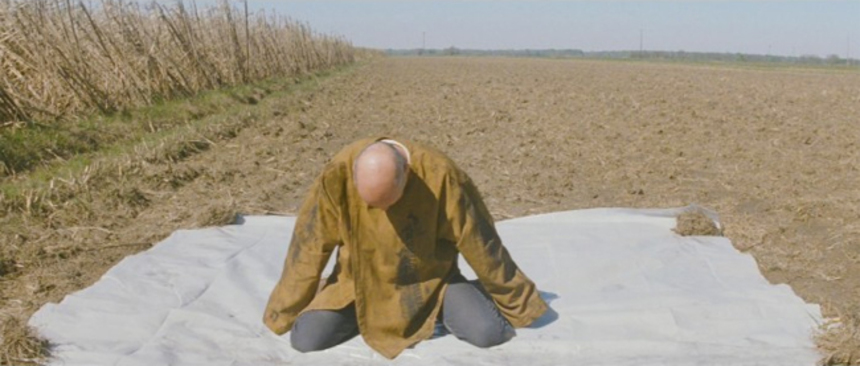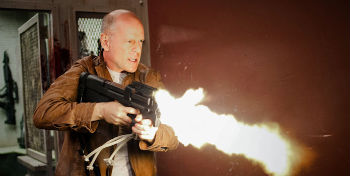TIFF 2012 Feature: LOOPER Offers Originality and Resonance from Tried and True Time Travel Tropes

Empiricist founding father John Locke proposed a curious scenario with, of all things, his socks. It goes something like this: If you had a hole in your sock and had to patch it over, you'd probably call it the same sock, more or less. But if you developed another hole, then another, to the point where all the original material of that sock was replaced, would it still be the same sock?
Rian Johnson's exemplary and astonishingly sophisticated time travel film asks the question, after 30 years of life (and life lessons) are you still you? Joseph Gordon-Levitt and Bruce Willis are playing Joe, an assassin who kills for the mafia of 2070, even if the present is 2044. Time travel may have been invented somewhere between that span of years, but it was immediately outlawed and then equally immediately co-opted by the mafia as a unique way to dispose of people that they want gone. Send them back to 2044 and have a 'Looper,' a member of Joe's profession, kill and burn the remains effectively destroying the evidence decades before anyone will need to look for it. The catch is that Loopers eventually have to be retired themselves, and are generally retired by themselves, unbeknown by themselves until they see themselves.
Keep up with me now, we're in the in the tall cane.
Shockingly, these young assassins generally have a big night on the town after they retire themselves. But, like Logan's Run or Minority Report, we all apt run in the end when given enough wind of what's coming. So, when Young-Joe botches the murder of Old-Joe, he has a bit of a conundrum. Actually, he has a full blown existential crisis, complicated by the fact that Old-Joe might just be Locke's over-patched socks. That is to say, is Young-Joe really stepping on his own toes by telling Old-Joe to piss off? Or, going a step further, hunting him down for his mafia masters? From the other side of the equation, consider if you at fifty met yourself at twenty, wouldn't you want to punch that young twerp in the face?
Looper is perhaps the best piece of time-travel brainfood since Primer. It is notable that that film's writer/director, Shane Carruth, offered his services as some sort of Time-Travel Consultant (a good job if you can get it!) Looper has the money and wherewithal for big action set-pieces, loads of interesting gadgetry and an off-the-wall penchant for wardrobe choices, but it ends up being a surprisingly effective character piece; even a showcase for its actors. It is also really quite funny in how it tips its hand in terms of an awareness of the limitations of the genre, even as it charges right ahead at demonstrating there is still room for expansion. If you make enough holes and patches ... new socks.
 And yet all of these elements are balanced and combined into such a satisfying package in a two hour timeframe. It's kind of breathtaking. Looper lovingly references elements and tropes of the bright lights in the genre over the years, from Back To The Future and The Terminator, to a few hat-tips towards Rod Serling's TV staple, The Twilight Zone, and peppered with light touches on Philip K. Dick and Paul Verhoeven, but it repurposes this awareness into a fully confident and personal vision. It flirts with being a both a Western and Dark City (both in Gat-enforcer garb and affectated identity crises.) A character utters the lament, "All my ridiculous shit!" in the context of life choices and how they affect the here and now. An exasperated bit of fatalism spoken by Emily Blunt who is tough, sweaty and vulnerable, a kind of Sarah Connor tough gal -- her character is, perhaps cheekily, named "Sara" -- that sees a reversal of that waitress to warrior arc.
And yet all of these elements are balanced and combined into such a satisfying package in a two hour timeframe. It's kind of breathtaking. Looper lovingly references elements and tropes of the bright lights in the genre over the years, from Back To The Future and The Terminator, to a few hat-tips towards Rod Serling's TV staple, The Twilight Zone, and peppered with light touches on Philip K. Dick and Paul Verhoeven, but it repurposes this awareness into a fully confident and personal vision. It flirts with being a both a Western and Dark City (both in Gat-enforcer garb and affectated identity crises.) A character utters the lament, "All my ridiculous shit!" in the context of life choices and how they affect the here and now. An exasperated bit of fatalism spoken by Emily Blunt who is tough, sweaty and vulnerable, a kind of Sarah Connor tough gal -- her character is, perhaps cheekily, named "Sara" -- that sees a reversal of that waitress to warrior arc.
Like the best lines of dialogue in the film, there are several meanings that reveal themselves with time. It delights on all counts in flirting with expectations of the genre, but then heads into entirely new, and emotionally deeper, territory. It rewards you for keeping up with or even occasionally getting ahead of where it is going, but then takes some rather surprising chances with its characters and the audience. Willis playing a time travelling future-man recalls his turn as a straight-jacketed myopic-Cassandra in Terry Gilliam's La Jetee expansion, 12 Monkeys. Likewise, when the character totes a machine gun (ho-ho-ho) it recalls Die Hard or any number of his patented everyman-tough-guys. Johnson uses and subverts even these meta-expectations and funnels them right back into some pure old-fashioned storytelling.
But then consider Jeff Daniels playing a mafia middle-manager with humour and grace. Seriously, folks, who casts Daniels as an action-movie villain? But it works. As does the retooling of his regular actor Noah Segan as a not quite competent (but still very dangerous) thug with some mentor/father issues and a rather large gun. This is one of the film's many wildcards. There is a density of supporting and side characters, too many to be mentioned here, all serving their own purpose, existing in a larger world. Johnson likes his characters and gives them great dialogue, but is not afraid of offing them either with casual cool or with dramatic weight. Looper, despite a change in genres once again for its writer/director, offers an chutney of the stylistic chutzpah shown in the wounded neo-noir Brick and the con-artist glee on display in The Brothers Bloom. The film is a significant step forward. It is a calling card towards any offers of risk-taking studio efforts along the lines of Inception or Master & Commander.
 Never allowing himself to be bogged down explaining the details (and paradoxes) of time-travel, rather letting the rules (and regulations) demonstrate themselves as the plot thickens, Johnson keeps things moving at an often alarming pace, but never loses sight of the characters or their desires and fears. There may be serious ramifications if you go back into the past and attempt to kill Hitler (or trample the wrong Bradbury butterfly), but the film keeps its focus squarely on the person-to-person relationships in 2044 and 2070 and where the twain may meet, converge, diverge. The stakes are still quite high, even if you often lose track of who is supposed to be the hero and who is the anti-hero.
Never allowing himself to be bogged down explaining the details (and paradoxes) of time-travel, rather letting the rules (and regulations) demonstrate themselves as the plot thickens, Johnson keeps things moving at an often alarming pace, but never loses sight of the characters or their desires and fears. There may be serious ramifications if you go back into the past and attempt to kill Hitler (or trample the wrong Bradbury butterfly), but the film keeps its focus squarely on the person-to-person relationships in 2044 and 2070 and where the twain may meet, converge, diverge. The stakes are still quite high, even if you often lose track of who is supposed to be the hero and who is the anti-hero.
A considerable montage at the midpoint of the film which serves to show just how JGL will age into Bruce Willis is a startling (even disorienting) choice, but in hindsight, it is quite essential to what type of story is being told. Big montages, or glimpses of technologies, delight us with the details of this particular world; they flit by with surprising density. But really, it is the simple things that leave a lasting impression. Whether it is Gordon-Levitt practicing his French in anticipation of a change of scenery, or comfortably bantering with a waitress in a diner, echoed later with a decidedly more serious (and witty) back and forth between both Joes in the same spot, or a hammer resting casually under a sheaf of papers on an imposing desk.
 The endless poverty in the city and massive gap between the haves and have-nots tells you all you need to know about morality and empathy in the future. Endless rows of dying sugar-cane on Sara's farm (seeds for future growth) tell us much we need to know about Sara and her present predicament of child rearing in a dangerous world. It is the little ones you have got to look out for; they are probably not going to be themselves in about 30 years.
The endless poverty in the city and massive gap between the haves and have-nots tells you all you need to know about morality and empathy in the future. Endless rows of dying sugar-cane on Sara's farm (seeds for future growth) tell us much we need to know about Sara and her present predicament of child rearing in a dangerous world. It is the little ones you have got to look out for; they are probably not going to be themselves in about 30 years.
Looper served as the opening night presentation of the 2012 Toronto International Film Festival. It plays at Fantastic Fest in Austin later this month before opening wide across Canada and the U.S. on Friday, September 28.







